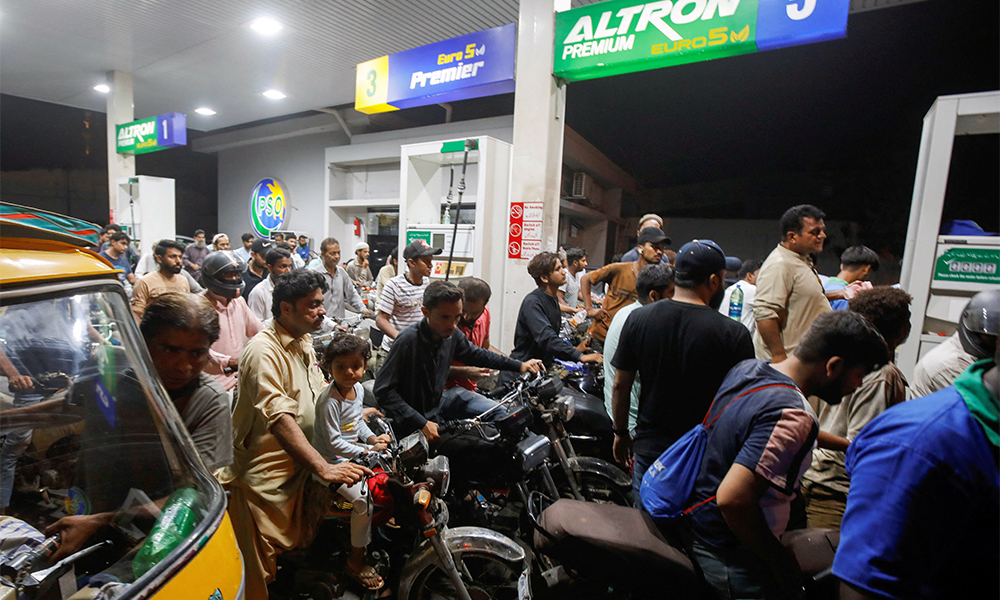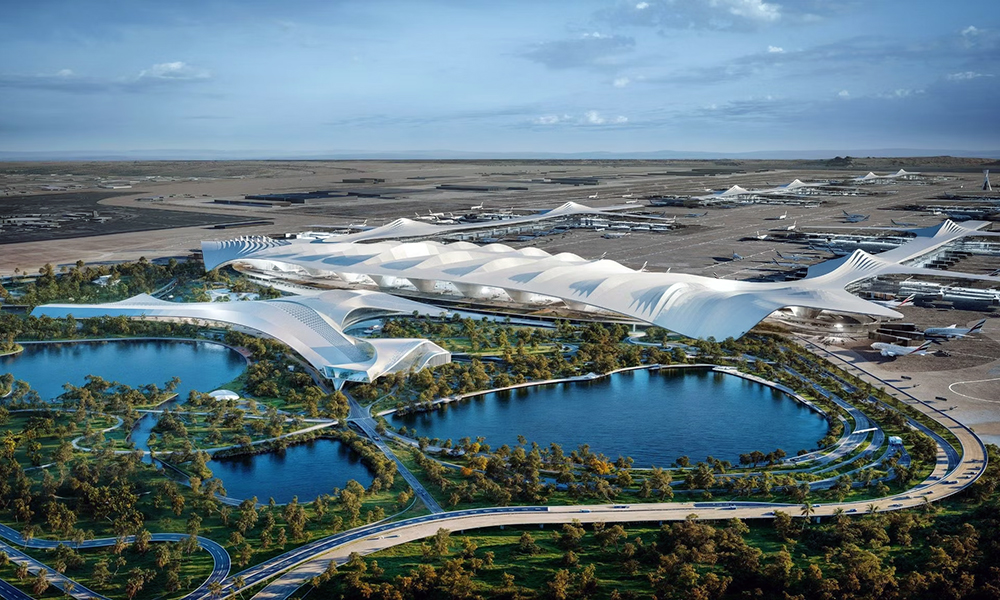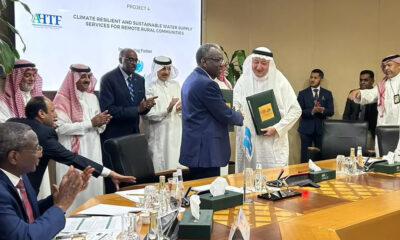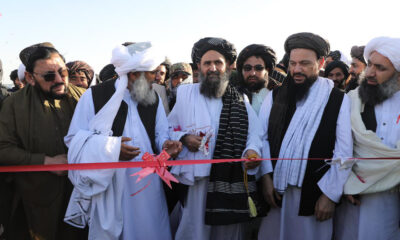Regional
Pakistan clinches last-gasp $3 billion IMF bailout

Pakistan secured a badly-needed $3 billion short-term financial package from the International Monetary Fund on Friday, giving the South Asian economy respite as it teeters on the brink of default.
In a long-awaited decision for Pakistan, the IMF said it had reached a staff-level deal with the 220 million nation, which will now be subject to approval by its board in July.
The new nine-month standby arrangement came hours before a current IMF agreement expires, offering relief to Pakistan, which is battling an acute balance of payments crisis.
Prime Minister Shehbaz Sharif said it would put Pakistan “on the path of sustainable economic growth”.
With sky-high inflation and foreign exchange reserves barely enough to cover one month of controlled imports, which analysts say Pakistan’s economic crisis could have spiraled into a debt default in the absence of an IMF deal, Reuters reported.
The deal came only after Sharif held marathon meetings with IMF head Kristalina Georgieva on June 22, which he said represented “a turning point” as the fund’s managing director had not initially appeared very forthcoming.
Pakistan will receive formal documents on the deal later on Friday, Finance Minister Ishaq Dar told Reuters, which he said he would “sign, seal and return by tonight”.
The new deal, which Dar said on Thursday was expected soon, will disburse an upfront amount of $1.1 billion shortly after the IMF board’s meeting in July, he said.
Dar said Pakistan aimed to take the central bank’s foreign exchange reserves to $14 billion by the end of July. “We have stopped the decline, now we have to turn to growth,” he added.
Pakistan’s sovereign dollar bonds were trading higher after the announcement, with the 2024 issue enjoying the biggest gains, up more than 8 cents at just above 70 cents in the dollar, according to Tradeweb data.
The gains were most pronounced in shorter-dated bonds, reflecting lingering skepticism over the longer-term fiscal outlook for the country.
The $3 billion IMF funding is higher than expected as it looks set to replace the remaining $2.5 billion from a $6.5 billion longer-term Extended Fund Facility agreed in 2019.
The deal will also unlock other bilateral and multilateral financing. Long-time allies Saudi Arabia, the UAE and China have already pledged or rolled over billions of loans.
“This will support near-term policy efforts and replenish gross reserves,” the IMF said.
The new arrangement builds on the 2019 programme, IMF official Nathan Porter said in a statement, adding that Pakistan’s economy had faced several challenges in recent times, including devastating floods and rising commodity prices.
“Despite the authorities’ efforts to reduce imports and the trade deficit, reserves have declined to very low levels. Liquidity conditions in the power sector also remain acute,” Porter said.
“Given these challenges, the new arrangement would provide a policy anchor and a framework for financial support from multilateral and bilateral partners in the period ahead.”
Porter also pointed out the power sector’s buildup of arrears and frequent power outages, Reuters reported.
Reforms in the energy sector, which has accumulated nearly 3.6 trillion Pakistani rupees ($12.58 billion) in debt, has been a cornerstone of the IMF talks.
The IMF said it would want steadfast policy implementation by Pakistan to overcome challenges, “particularly in the energy sector”, where it expects a rise in electricity prices.
Dar confirmed that the hike will come ahead of the IMF board review of the bailout, saying the rebasing to be done in July will make about three to four rupees a unit difference.
“Reform does not, must not, mean raising tariff endlessly,” Pakistan’s Minister for Power Khurram Dastgir told Reuters.
With the tenure of the current government ending in August, Dastgir said it had put in place an “aggressive medium-to-long-term plan” to increase renewable energy which was only possible if long-term assistance is available.
Reforms taken
Islamabad has taken measures demanded by the IMF since its mission arrived in Pakistan earlier this year, including revising its 2023-24 budget and a key policy rate hike to 22% in recent days.
It also got Pakistan to raise more than 385 billion rupee ($1.34 billion) in new taxation to meet the IMF’s fiscal adjustments.
The IMF said the central bank should remain proactive to reduce inflation and maintain a foreign exchange framework.
The painful adjustments have already fuelled all time high inflation of 38% year-on-year in May.
“The FY24 budget advances a primary surplus of around 0.4 percent of GDP,” Porter said, adding it will be important that the budget is executed as planned, and authorities resist pressures for unbudgeted spending or tax exemptions.
“This new programme is far better than our expectations,” said Mohammed Sohail of Topline Securities in Karachi, adding there while were a lot of uncertainties on what would happen after a new government comes to power it would “definitely help restore some investor confidence”.
‘Tough journey’ ahead
Meanwhile, on Friday night, Pakistan’s Prime Minister Shehbaz Sharif took to twitter and said while the IMF stand-by agreement “is a much-needed breather, which will help the country achieve economic stability, the nations are not built through loans. I pray for this new program to be the last one.”
He went on to thank Pakistan’s “friends & partners such as China, Saudi Arabia, UAE & Islamic Development Fund for standing by Pakistan at the time of massive economic challenges.
“Under a whole-of-the-government approach, we have worked out an Economic Revival Plan, which will focus on unlocking our strategic potential in agriculture, mine & minerals, defense production & information technology. The Plan will bring up investments of billions of dollars & create job opportunities for four million people.
“It may be a tough journey but as they say, ‘When the going gets tough, the tough gets going’,” he said.
Regional
Dubai ruler approves new $35 billion airport terminal

Dubai’s ruler Sheikh Mohammed bin Rashid al-Maktoum approved a new passenger terminal in Al Maktoum International airport worth 128 billion AED ($34.85 billion), he said on Sunday in a post on X.
The Al Maktoum International Airport will be the largest in the world with a capacity of up to 260 million passengers, and five times the size of Dubai International Airport, he added, saying that all operations at Dubai airport would be transferred to Al Maktoum in the coming years, Reuters reported.
The Al Maktoum airport will also include 400 terminal gates and five runways, he said.
The airport will be the new home of flagship carrier Emirates and its sister low-cost airline Flydubai along with all airline partners connecting the world to and from Dubai, Dubai state-owned airline Emirates chairman Sheikh Ahmed bin Saeed al-Maktoum said.
The move “further solidifies Dubai’s position as a leading aviation hub on the world stage”, the CEO of Dubai Airports, Paul Griffiths, was quoted as saying by the Dubai Media Office.
Regional
Iraq criminalises same-sex relationships with maximum 15 years in prison

Iraq’s parliament passed a law criminalising same-sex relationships with a maximum 15-year prison sentence on Saturday, in a move it said aimed to uphold religious values but was condemned by rights advocates as the latest attack on the LGBT community in Iraq.
The law aims to “protect Iraqi society from moral depravity and the calls for homosexuality that have overtaken the world,” Reuters reported citing a copy of the law.
It was backed mainly by conservative Shi’ite Muslim parties who form the largest coalition in mainly Muslim Iraq’s parliament.
The Law on Combating Prostitution and Homosexuality bans same-sex relations with at least 10 years and a maximum of 15 years in prison, and mandates at least seven years in prison for anybody who promotes homosexuality or prostitution.
It also imposes between one and three years in prison for anyone who changes their “biological gender” or wilfully dresses in an effeminate manner.
The bill had initially included the death penalty for same-sex acts but was amended before being passed after strong opposition from the United States and European nations.
Until Saturday, Iraq didn’t explicitly criminalise gay sex, though loosely defined morality clauses in its penal code had been used to target LGBT people, and members of the community have also been killed by armed groups and individuals.
“The Iraqi parliament’s passage of the anti-LGBT law rubber-stamps Iraq’s appalling record of rights violations against LGBT people and is a serious blow to fundamental human rights,” Rasha Younes, deputy director of the LGBT rights programme at Human Rights Watch, told Reuters.
Iraqi officials who oversee human rights could not immediately be reached for comment.
Major Iraqi parties have in the past year stepped up criticism of LGBT rights, with rainbow flags frequently being burned in protests by both ruling and opposition conservative Shi’ite Muslim factions last year.
More than 60 countries criminalise gay sex, while same-sex sexual acts are legal in more than 130 countries, according to Our World in Data.
Regional
China to host Hamas, Fatah for Palestinian unity talks

China will host Palestinian unity talks between Hamas and its rivals Fatah, the two groups and a Beijing-based diplomat said on Friday, a notable Chinese foray into Palestinian diplomacy amid the war in the Gaza Strip.
Hamas, which controls Gaza, is the group whose fighters stormed into Israeli towns on Oct. 7, killing 1,200 people and capturing 253 hostages. Israel has sworn to annihilate Hamas in an onslaught that has killed more than 34,000 Palestinians.
Fatah is the movement of Mahmoud Abbas, president of the Western-backed Palestinian Authority, which exercises limited self-rule in the Israeli occupied West Bank.
The two rival Palestinian factions have failed to heal their political disputes since Hamas fighters expelled Fatah from Gaza in a short war in 2007. Washington is wary of moves to reconcile the two groups, as it supports the PA but has banned Hamas as terrorists.
A Fatah official told Reuters a delegation, led by the group’s senior official Azzam Al-Ahmed, had left for China. A Hamas official said the faction’s team for the talks, led by senior Hamas official Moussa Abu Marzouk, would be flying there later on Friday.
“We support strengthening the authority of the Palestinian National Authority, and support all Palestinian factions in achieving reconciliation and increasing solidarity through dialogue and consultation,” said Chinese Foreign Ministry spokesperson Wang Wenbin at a regular briefing on Friday, without confirming the meeting.
The visit will be the first time a Hamas delegation is publicly known to have gone to China since the start of the war in Gaza. A Chinese diplomat, Wang Kejian, met Hamas chief Ismail Haniyeh in Qatar last month, according to the Chinese foreign ministry.
The Beijing-based diplomat, who had been briefed on the matter, said the talks aimed to support efforts to reconcile the two Palestinian rival groups.
China has lately demonstrated growing diplomatic influence in the Middle East, where it enjoys strong ties with Arab nations and Iran. Last year, Beijing brokered a breakthrough peace deal between longstanding regional foes Saudi Arabia and Iran.
U.S. Secretary of State Antony Blinken said he discussed with Chinese President Xi Jinping and other officials in Beijing on Friday how China can play a constructive role in global crises, including the Middle East.
Chinese officials have ramped up advocacy for the Palestinians in international forums in recent months, calling for a larger-scale Israeli-Palestinian peace conference and a specific timetable to implement a two-state solution.
In February, Beijing urged the International Court of Justice (ICJ) to give its opinion on the Israeli occupation of the Palestinian Territories, which it said was illegal.
More recently, China has been pushing for Palestine to join the United Nations, which Beijing’s top diplomat Wang Yi said last week would “rectify a prolonged historical injustice”.
(Reuters)
-

 Sport3 days ago
Sport3 days agoAfghanistan beat Iraq 5-3, inch closer to Futsal World Cup berth
-

 Regional3 days ago
Regional3 days agoNew UK sanctions target Iranian drone industry
-

 Regional4 days ago
Regional4 days agoTurkey accuses U.S. of double standards over Gaza in rights report
-

 Latest News3 days ago
Latest News3 days agoEU allocates 17 million euros to support Afghans on the move
-

 Latest News2 days ago
Latest News2 days agoPakistan extends registered Afghan refugees’ stay till June 30
-

 World4 days ago
World4 days agoUS student protests over Gaza intensify despite arrests
-

 Regional2 days ago
Regional2 days agoChina to host Hamas, Fatah for Palestinian unity talks
-

 Sport1 day ago
Sport1 day agoAfghanistan qualify for FIFA Futsal World Cup for first time ever
























